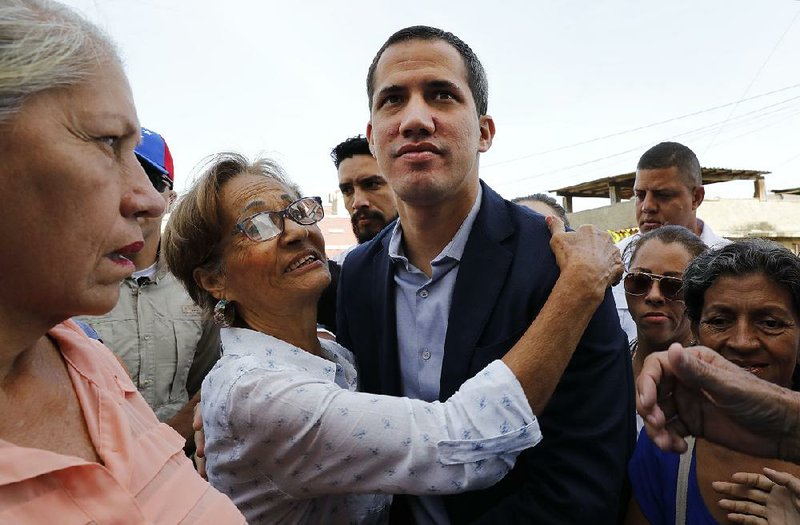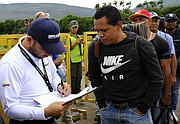BOGOTA, Colombia -- Negotiations aimed at breaking Venezuela's political standoff will resume this week, likely on the Caribbean island of Barbados, according to three people familiar with the talks.
The sources said the location for the talks will be decided by the government of Norway, which is leading the mediation effort and hosted two previous rounds of exploratory talks in May. While Barbados is for now the preferred location, one opposition source said details were still being worked out and the site could be changed to Norway at the last minute.
The people spoke to The Associated Press on condition of anonymity because representatives of President Nicolas Maduro and the U.S.-backed opposition leader, Juan Guaido, have not publicly confirmed the officials' participation.
Guaido has downplayed the possibility of a breakthrough, insisting that the condition for any talks be early presidential elections -- something Maduro has so far rejected.
But aides say Guaido is under increasing pressure from the U.S. and other foreign governments not to walk away from the negotiating table until it's clear Maduro has no real intention of yielding power. If Guaido walks away, they said, it would hand a symbolic victory to Maduro.
The opposition has complained that Maduro has used past negotiations sponsored by the Vatican and others to buy time.
Guaido, the head of the opposition-controlled congress, re-energized a divided opposition movement by declaring himself president at a mass protest in January after arguing that Maduro's re-election last year was unconstitutional, noting that several key opponents were barred from running. He quickly won recognition from the U.S. and dozens of other governments around the world.
But his momentum has since stalled, and after a failed military uprising in April, most of the armed forces' top command -- the traditional arbiter of political disputes in Venezuela -- has closed ranks behind the president.
Maduro, meanwhile, said Saturday that his government was releasing and deporting 59 Colombians arrested in 2016. Venezuelan officials accused them of being part of a plan to destabilize the country.
Alfredo Romero of the prisoner-rights group Foro Penal said many had been living in Venezuela for years and didn't even know one another. None was ever charged. His group estimates that there are more than 700 political prisoners still in Venezuela.
The United Nations immediately praised the release of the prisoners, which came days after a visit to Caracas by its top human-rights official, Michelle Bachelet. The U.N. said it expects more prisoner releases in the coming days.
In a statement posted on Twitter, the U.N. human-rights agency called the release of the Colombians "a positive sign that the Govt is fulfilling the human rights commitments" made during Bachelet's visit.
VENEZUELA EXODUS
Maduro has insisted on dialogue with the opposition as the only way forward for Venezuela as crippling U.S. oil sanctions exacerbate a crisis marked by food, fuel and medicine shortages that have forced 4 million people -- 10% of Venezuela's population -- to flee the country in recent years.
On Friday, the Organization of American States projected that by the end of 2020 that number will rise to 8 million Venezuelans, surpassing the 6.7 million Syrians who have fled their country.
Colombia is the top destination for Venezuelan migrants, with 1.3 million people. It's followed by Peru, home to 850,000 migrants; Chile, with 288,000; and Ecuador, with 283,000. The four countries account for about 67.5% of all Venezuelan migrants -- and all the nations have said that the influx is straining their social services.
The report also found that the international community isn't responding to the Venezuelan crisis as it has to problems in other parts of the world.
While the global community has provided $33 billion in aid to Syria's refugees, it has given only $300 million to Venezuela's 4 million migrants and refugees, said Dany Bahar, a Brookings Institution researcher who worked on the report. That's the equivalent of $5,000 for each Syrian refugee, and less than $100 for each Venezuelan migrant.
"The international community has to listen to the voice of the region," Colombian Foreign Minister Carlos Holmes Trujillo said in reaction to the study. "This report illustrates not only how slow the [international] response has been, but also the lack of generosity."
Luis Almagro, the secretary-general of the Organization of American States, used the report to underscore the need for Maduro to step down and make way for new elections.
"We cannot lose sight of the fact that this exodus has only one cause, and that's the dictatorship of Nicolas Maduro," he said. "The only solution for Venezuelan migrants is the end of the dictatorship."
The Organization of American States' numbers are among the largest predictions that have been made about the Venezuelan crisis. The U.N. has estimated there might be 5.4 million Venezuelans living abroad at the end of this year.
The Venezuelan regime has claimed that the U.N. figures and other migration estimates are exaggerated -- politicized to paint the nation in the worst possible light. But it hasn't provided figures of its own.
Venezuelans are currently leaving at a rate of 5,000 per day. In order to hit the 8 million mark -- the upper end of the organization's projection -- the outflow would have to jump to more than 7,300 people per day on average.
David Smolansky, the head of the working group that produced the report, acknowledged that it was just a prediction, but one solidly based on the country's hyperinflation and worsening conditions. He said the study found five main reasons Venezuelans are leaving: generalized violence, human-rights violations, the collapse of public services, the economic crisis and the humanitarian crisis, which includes food and medicine shortages.
"People aren't leaving for economic reasons or voluntarily," he said. "This is forced migration. ... How desperate does a mother have to be to carry her child in her arms for thousands of miles?"
Information for this article was contributed by Joshua Goodman and Scott Smith of The Associated Press; and by Jim Wyss of the Miami Herald.
A Section on 06/30/2019

